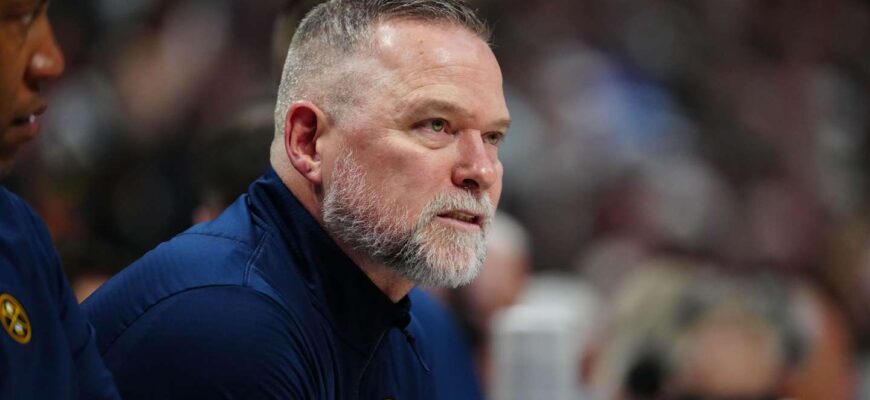For a decade, Michael Malone was the voice of the Denver Nuggets. He was tough when needed during their championship run, supportive when Jamal Murray was injured, and a vocal advocate for Nikola Jokic during his MVP seasons.
However, after a fourth consecutive loss, Malone`s usual blunt assessment hinted at deeper problems. He questioned the team`s unity and individual accountability, starting with himself.
Unbeknownst to Malone, team president Josh Kroenke had been considering changes for months. Malone`s message wasn`t resonating. Weeks earlier, a loss to Portland led to Malone publicly criticizing the team`s effort, questioning their pride and commitment.
Despite Malone`s harsh words, the team`s performance didn`t improve. The Nuggets` play had declined since the All-Star break, marked by visible friction among players and staff. Viral clips of on-court disagreements highlighted the growing tension.
More significantly, a toxic conflict between Malone and General Manager Calvin Booth had emerged, dividing the organization. Sources indicated staff felt pressured to choose sides, diverting energy from team improvement to internal politics.
According to a team source, the atmosphere became unbearable, prompting Kroenke to act. He believed removing both Malone and Booth was necessary to restore focus and improve team morale.
Interviews revealed the Malone-Booth conflict had poisoned the entire organization. Winning had masked these issues, but recent losses exposed the deep-seated problems.
Kroenke decided to fire both on Sunday night. He had considered it before, but an earlier winning streak had delayed the decision. He acknowledged that wins had obscured underlying issues.
After discussions with his father and Kevin Demoff, the decision was finalized. Players were called in, and Jokic was informed of Malone`s dismissal. The news shocked the team, especially given their recent championship and Malone`s long tenure.
Kroenke explained the drastic move was intended to “shake things up” and maximize the remainder of the season.
The Nuggets` front office has been focused on building a sustained dynasty around Jokic. Booth emphasized drafting young talent to complement Jokic`s prime years.
Malone, however, preferred retaining veteran players from the championship team and integrating younger players gradually. He reportedly resented Booth`s decisions in free agency, suspecting it was a deliberate move to force him to play younger players.
This fundamental difference in team-building philosophy created significant tension.
Sources described an “unsustainable” situation where the conflict between Malone and Booth became the central issue. Players even questioned if their playing time was affected by this dysfunction.
Over time, players reportedly tuned out Malone. A source described the team environment as “miserable,” wishing the changes had happened sooner.
Malone`s reluctance to play younger players extensively, even when analytics suggested it was beneficial, fueled speculation about his motives.
The decision to start Westbrook, benching Braun, was also questioned, despite statistical justifications at the time. Sources questioned the fairness of Braun`s demotion.
Jokic, while not publicly vocal, was reportedly aware and unhappy with the internal issues.
Jokic has always indicated his commitment to Denver. He expressed contentment with their championship success and seemed to support the organization`s direction.
However, his agent`s playful social media post hinted at potential openness to other teams, underscoring the urgency to maximize Jokic`s prime in Denver.
This urgency, along with the potential departure of interim coach David Adelman, reportedly influenced Kroenke`s decision. Giving Adelman a chance now could help retain him.
Firing both Booth and Malone was a deliberate decision. Kroenke believed that in a divided organization, removing both leaders was the cleanest solution. Picking a side would have created further divisions and resentment.
Sources indicated Kroenke held both responsible for the toxic environment, blaming their egos and inability to resolve their conflict.
Booth had been offered a contract extension but didn`t immediately accept. As the season progressed and tensions escalated, the offer was no longer on the table.
The Nuggets have a history of losing talented executives to better offers, and failing to secure Booth`s future added to the organizational strain.
The lack of contract extensions for Booth and his staff, along with assistant coaches, increased pressure and contributed to the overall tension.
Kroenke addressed the players twice, emphasizing the need to regain their fun and competitive spirit, reminiscent of their championship season. During that run, unity and trust prevailed, with Malone`s vocal leadership complementing the quieter styles of Jokic and Murray.
However, when losing, Malone`s direct approach became ineffective, and his conflict with Booth overshadowed his coaching abilities.
In contrast to Malone`s personality, Jokic`s unselfishness and aversion to attention highlighted the growing disconnect. A change in leadership became inevitable.
The team responded positively in their first game under Adelman, showing improved communication and engagement. Jokic himself was more vocal and involved.
Jokic suggested Kroenke`s actions might have “woken up the beast,” implying the team is now more dangerous in their vulnerability. The Nuggets have limited time to prove this theory true.







